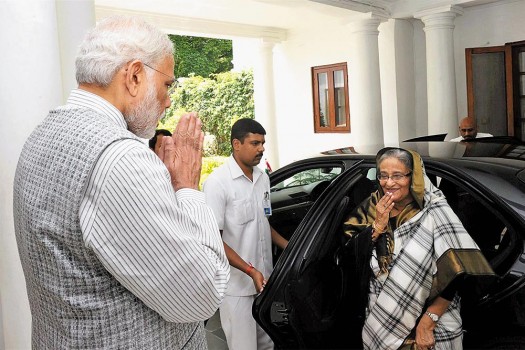
It is not understandable why the properties and temples of Hindus are being vandalized when the country is in the midst of its liberation celebrations. Forty five years ago India, which has a Hindu majority population, helped the people of then East Pakistan wrest independence from the unwilling hands of the army-dominated West Pakistan. More than 2,000 Indian soldiers and officers sacrificed their lives in the war against Islamabad.
Above all, Prime Minister Sheikh Hasina is the daughter of Sheikh Mujib-ur-Rehman who liberated the territory through people’s movement which he built. Her credentials of fighting against religious forces cannot be doubted. It is, however, another matter that she has used action against fundamentalists as a battle against opposition parties.
The Bangladesh Nationalist Party (BNP) complains that her wrath is directed against them because they are the only alternative. The ruling Awami League headed by Sheikh Hasina, they complain, is using all tactics to finish them. Even the rumours have been set afloat that they are anti-India so that Khalida Zia’s imaged is tarnished.
I recall my meeting Sheikh Mujib-ur-Rehman at Dhaka soon after the liberation of what is now called Bangladesh and complained to him that there was a lot of anti-India feeling. I had gone to the Dhaka Press Club and found the media hands jibing that the smoked Hilsa fish was available at Kolkata hotels but not in Bangladesh. They also strongly criticized New Delhi and Kolkata for appropriating the gains of liberation.
Lt. General Jagjit Singh Aurora, who led the Indian troops, was particularly mentioned for looting the rich West Pakistanis who were transacting business from the then East Pakistan. Sheikh Mujib-ur-Rehman told me that a Bengali did not forget the good done by the one who gave a glass of water: “Your countrymen have died here while helping the Mukti Vahini in liberating the territory.” He said that secularism in Bangladesh was deep rooted and could not be ignored in any situation.
But strangely the secular identify of Bangladesh is being questioned now. The Jamaat-e-Islamia, which was once part of the government during the military regime of General H.M. Ershad, is trying its best to sell the Islamic way of governance and wanted close relations with an Islamic state in the world. Fortunately, there is practically no response to this in Bangladesh.
However, the unpopularity of Sheikh Hasina has made the Bangladeshis appear not only as anti-India but as soft Islamists. She is only busy obliterating the followers of Begum Khalida Zia, the main opposition leader. In this fight, even the secularists who are on the side of Begum Zia are being dubbed as communalists and constantly hounded.
Sheikh Hasina is now anxious to entrench and not part with power. The opposition parties openly say that they may not be able to remove her in elections because she would not hold a fair pool. She is already talking of dynastic rule and consulting her son in America openly in all government matters.
In line with that thinking, the Prime Minister is appointing her own followers at key positions in different universities and educational institutions even though they lack competence and literary qualifications. In the process, she is destroying the educational system based on merit. But this does not concern her because she believes that in the name of secularism she can put any of her loyalists at high positions. She behaves as if it were her birth right to rule.
A bill is sought to be enacted where anyone challenging her father or his rule would be considered anti-national. This is, indeed, a strange way of looking at democratic traditions. But once this becomes a law, stranger things can take place in Bangladesh. The opposition parties, which are her main targets today, will be left with no voice to rise in the days to come. The environment would be more authoritarian and dictatorial. And a very few would be able to question the government.
In all of her actions, Sheikh Hasina has forgotten the welfare of the country. The problem that Bangladesh faces today, as it celebrates its birth anniversary, is how far the government has been able to help people benefit through economic development. Unfortunately, this is not the case. The Prime Minister counts her gains only in terms of key jobs she has given to her staunch followers.
The judiciary is no more independent. There are no Collegiums to select judges as is the case in India. The government directly appoints them. And as the first foreign minister of Bangladesh Kamal Hussain, who was in town, told despite the independent judges on the bench some tend to tilt towards the establishment. They behave as if someone is overlooking their shoulders. Accordingly, their judgments reflect a slant which does not behove an independent judiciary. The Hindu judges feel the pressure.
I recall the conversation which I had with our High Commissioner at Dhaka Subirmal Dutt. In reply to my complaint that the plight of Bangladeshi Hindus would be unenviable he said that this point was discussed before India’s help. It was assumed that most of the one million Hindus living there would migrate to India and many of those staying back would embrace Islam.
This may be true but it was never imagined that the properties and temples of Hindus would be destroyed. The fact that there were more than 200 million Muslims in India would influence the Bangladeshi Muslims not to do anything which would alienate New Delhi and the Hindu population of India.
Bangladesh has to renew its ethos, the image of a secular democratic country. Organisations like the Jammat-e-Islamia would drag it to fundamentalism. But that was not in the mind of Sheikh Mujib-ur-Rehman, father of the nation, who wanted to establish a country which would not discriminate against the minorities. Sheikh Hasina, to her credit, wants to follow his footprints. But she has become authoritarian although her actions do not always reflect that. This is the tragedy of Bangladesh.

